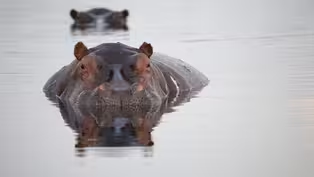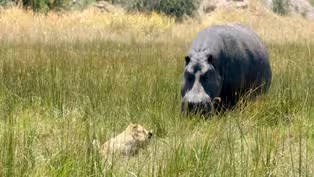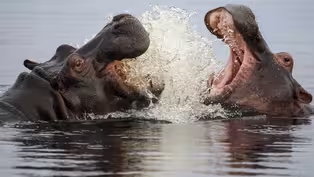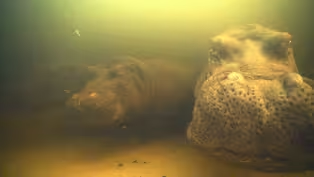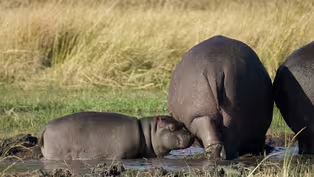
Hippos: Africa's River Giants
Season 38 Episode 10 | 53m 13sVideo has Closed Captions
Go beneath the surface and meet Africa’s river giants, the hippos
Go beneath the surface and meet Africa’s river giants, the hippos. Discover an unexpected side of these aquatic mammals that can’t even swim as hippos protect their families, face their enemies and suffer in a drought. Narrated by David Attenborough.
Problems playing video? | Closed Captioning Feedback
Problems playing video? | Closed Captioning Feedback
Major support for NATURE is provided by The Arnhold Family in memory of Henry and Clarisse Arnhold, Sue and Edgar Wachenheim III, The Fairweather Foundation, Charles Rosenblum, Kathy Chiao and...

Hippos: Africa's River Giants
Season 38 Episode 10 | 53m 13sVideo has Closed Captions
Go beneath the surface and meet Africa’s river giants, the hippos. Discover an unexpected side of these aquatic mammals that can’t even swim as hippos protect their families, face their enemies and suffer in a drought. Narrated by David Attenborough.
Problems playing video? | Closed Captioning Feedback
How to Watch Nature
Nature is available to stream on pbs.org and the free PBS App, available on iPhone, Apple TV, Android TV, Android smartphones, Amazon Fire TV, Amazon Fire Tablet, Roku, Samsung Smart TV, and Vizio.
Buy Now
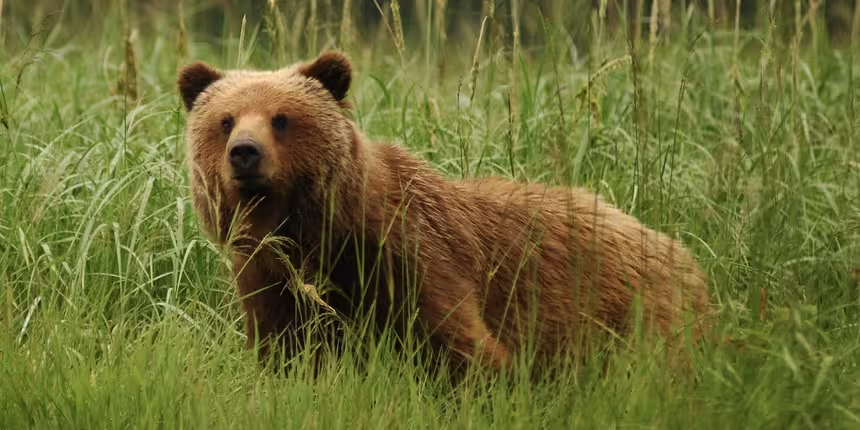
Explore More Ways to Watch
Bring the beauty and wonders of wildlife and natural history into your home with classic NATURE episodes.Providing Support for PBS.org
Learn Moreabout PBS online sponsorship♪♪ ATTENBOROUGH: The hippopotamus has long been a paradox.
♪♪ An animal that cannot swim... but whose life is utterly dependent on water.
♪♪ A vegetarian... who is also the most dangerous animal in Africa.
[ Hippos roaring ] ♪♪ In Botswana's Okavango Delta, we go beneath surface... ♪♪ ...to see them protect their families... [ Roaring ] ...face their enemies, and reveal their unexpected sensitivity and intelligence.
♪♪ This is the life of the hippo as never seen before.
♪♪ ♪♪ ♪♪ ♪♪ ♪♪ ATTENBOROUGH: The Okavango is one of southern Africa's great rivers.
♪♪ It flows north to south for almost 1,000 miles, but never reaches the sea.
♪♪ ♪♪ On its journey, it gathers an abundance of life, and becomes laden with sand and sediments which drift in its current.
♪♪ ♪♪ As it enters Botswana, it confronts the dry sands of the Kalahari desert, and its main arteries begin to slow.
Its rich sediments settle and form the largest inland delta in the world.
♪♪ ♪♪ A multitude of species thrive here.
♪♪ And all of these waterways rely on one remarkable animal... ♪♪ ...the hippopotamus.
♪♪ ♪♪ ♪♪ ♪♪ Hippos cannot swim.
The dense structure of their bones and the weight of their great bodies makes them sink.
In the deep water, they have to push themselves off the bottom in order to rise and take a breath.
But then they sink back down.
♪♪ ♪♪ They then hold their breath and walk and run on the bottom.
As they move through the swamp in search of fresh grazing, they break pathways through the weeds.
Where these pathways lead, the clear water follows.
♪♪ They link the big rivers to the smaller pools... ♪♪ ...opening up channels as they go.
♪♪ Soon, a complex web has been created throughout the swamp, along which water flows gently to nourish the land.
♪♪ These animals are the architects of the Okavango Delta.
♪♪ ♪♪ ♪♪ [ Birds chirping ] Hippos are naturally sociable.
They bunch together where they can stand and form groups known as pods.
In shallow water, they can stand and reach the surface.
[ Birds calling ] With eyes and nostrils located high on their heads, they can see and breathe whilst being almost completely submerged.
Surfacing and breathing for a hippo is completely automatic, even doing it while they sleep.
[ Hippo rumbling ] A dominant bull defends the pod.
But today, this one has other matters on his mind.
♪♪ A female hippo... is giving him the eye.
♪♪ ♪♪ Courtship takes place in the water where such hefty bodies are better supported than on land.
♪♪ And now, hippos reveal their sensitive side.
♪♪ Nuzzling and touching seems essential.
♪♪ Much of this dance happens under the surface.
♪♪ ♪♪ ♪♪ Mating sometimes lasts up to half an hour.
After eight months, an expectant hippo really does become heavily pregnant.
Experienced mothers about to give birth move away from the pod and find a quiet and shallow pool.
[ Birds chirping ] ♪♪ [ Baby hippo grunting ] The baby has to master life in the water from its first breath.
♪♪ This one, a male, seeks his mother's nipple almost immediately, and he has the ability to suckle underwater.
He instinctively folds back his ears and closes his nostrils.
♪♪ Weighing just 4% as much as an adult, a baby hippo is completely dependent on its mother.
She keeps an ever-watchful eye on him.
Isolation from the pod allows the calf to imprint on his mother.
It's vital that they forge a strong bond.
But her astute relatives haven't missed a thing... ...and curiosity draws them closer.
♪♪ Her calf is still far too young to meet the family.
She knows she will have to move him away.
♪♪ ♪♪ ♪♪ But this is a lot of effort on his first day, and he's tiring fast.
♪♪ ♪♪ ♪♪ Now safe, her baby begins to recover.
She creates a raft for him to rest his weary head.
♪♪ ♪♪ ♪♪ In only a few months' time, the water here will cease to flow.
3,000 square miles of swamp will dry and disappear... ...and all the hippos of the Okavango will face real hardship.
♪♪ [ Bird calling ] Water is the hippo's sanctuary.
It keeps them cool in the baking heat and provides the vegetation on which they depend... ...and safety away from predators.
But with all of this slowly evaporating, everyone will need to be prepared.
The calf is now several weeks old and has built up his strength.
It's time for him to meet the family.
Returning to the pod with a new baby is inevitably risky.
A mother has to re-establish that she's a member of the pod, and, in the excitement, a clumsy adult could crush her calf.
The dominant bull is right in her path.
If she stands her ground with him, half her battle could be won.
♪♪ [ Wailing ] But the real problem comes from an unexpected place.
Her previous calf is showing an unhealthy interest.
She's battle scarred and appears to have a quarrelsome nature.
Jealousy or curiosity?
Whichever it is, it's dangerous.
[ Rumbling ] Her calf is far too young to be pushed around like this.
He's frightened and stays close to his mother.
♪♪ [ Snorts ] ♪♪ ♪♪ [ Birds chirping ] [ Roars ] This has turned into an attack, and the mother must put a stop to it.
♪♪ The pair remain on the periphery of the pod.
But the rest of the family can still hear them.
[ Grunting ] Hippos are thought to Be the closest living relatives of whales, and they too make most of their vocalizations underwater.
Their head and jawbones capture vibrations and transmit them directly into the ear.
[ Grunting ] The vibrations become sound, and in these quiet waters, these can carry up to a mile.
When in an amphibious position, with eyes and nostrils above water and mouth and throat submerged, hippos have a remarkable talent -- transmitting vocalizations through the water... ....and the air at the same time.
A rare skill among land mammals.
With sensitive hearing, poor eyesight, and a nervous nature, unexpected sounds often lead to skittish and aggressive behavior.
[ Roars ] [ Baby grunting ] To stay in touch with mum, the calf emits a steady pulsing croak.
The others can hear it.
♪♪ And this startles the pod.
[ Grunting ] But eventually they get used to it.
♪♪ Underwater, the pod move closer.
♪♪ ♪♪ Mother and calf are thoroughly inspected... ♪♪ ...and finally, they are accepted.
♪♪ ♪♪ ♪♪ The calf is growing fast, and life in the pod returns to normal.
♪♪ Eating 80 lbs of grass a day is what a hippo needs to do.
But the youngest still need to learn how.
♪♪ ♪♪ As the delta begins to dry, all hippo pods will need to follow the water.
And having joined the rest of the family, these two can now safely move on.
[ Bird calling ] ♪♪ The season changes, and many of the flood plains have already disappeared.
♪♪ ♪♪ The channels become more defined as these fingers of water gradually retract to the north.
With all the hippo pods on the move, territories need to work in a simple way.
When a group arrives at a new pool, each family member is guarded by their dominant bull.
And he must mark the new boundaries of his transient territory.
He does this by splattering his scent in a spectacular fashion.
♪♪ ♪♪ These signposts of half-digested grass proclaim that this pool is mine.
A young male calf is intrigued.
One day, he may need to do this for himself.
But owning a territory and a family also means you need to defend it.
[ Birds chirping ] Dominant bulls are always vigilant.
As the land dries, nomadic males are on the move, seeking a new source of water.
[ Grunting ] An intruder tries to move into the dominant bull's pool.
♪♪ And the bull goes on the offensive.
[ Roaring ] ♪♪ [ Roars ] He must hold his ground and defend his pod.
[ Roaring ] ♪♪ ♪♪ A hippo's jaws have an enormous gape, which exposes their formidable tusks, and these are for fighting.
[ Roaring ] This is a full-on challenge.
♪♪ ♪♪ ♪♪ ♪♪ The biggest gape wins.
♪♪ He has protected his pod and, very importantly, his youngest calves.
New bulls kill the offspring of their defeated rivals.
♪♪ ♪♪ The loser escapes upriver.
Wounds like these can be fatal.
♪♪ ♪♪ ♪♪ ♪♪ ♪♪ As winter hits, the days become cooler.
The vegetation surrounding the channels is drying out.
Over the next few months, getting enough nutrients from the grass will be a real challenge.
And it forces the hippos to leave the edges of the channels and venture into dry areas in search of food.
[ Creature howls ] Day and night, they continue to graze.
[ Insects chirping ] But away from the water, hippos are very vulnerable.
[ Birds squawk ] ♪♪ Dawn reveals a death.
♪♪ Upriver, the intruder has succumbed to his injuries, and now his body is a feast for crocodiles.
♪♪ ♪♪ ♪♪ ♪♪ [ Hippo roars ] The resident bull clears the crocodiles away from his fallen foe and inspects the body.
♪♪ ♪♪ ♪♪ ♪♪ Licking, or mouthing, may be a way of collecting valuable nutrients.
♪♪ ♪♪ Perhaps it's their intelligence that drives this behavior.
♪♪ ♪♪ Maybe there is something here to do with mourning.
♪♪ Maybe it's a little bit of all these things.
♪♪ ♪♪ ♪♪ ♪♪ The stench of decay attracts lions.
The body of a hippo is a valuable prize in this dry land, and everyone knows it.
Bull hippos are the only ones that stand their ground against lions, and this bull wants them gone.
Two-ton hippos are quite capable of killing a lion.
[ Grunts ] He drives the predator away from his old enemy.
[ Hyenas calling ] In the darkness, hyenas have pulled the body ashore.
♪♪ And now they're tucking in with teeth that can crack bones.
♪♪ Nothing will be wasted.
[ Bones crunching ] ♪♪ ♪♪ [ Hyenas growling ] [ Crocodile snarls hyenas yipping ] The crocodiles certainly aren't giving up.
[ Crocodile snarls hyenas yipping ] ♪♪ The fuss and the noise seems to agitate the hippos.
[ Hippos grunting ] ♪♪ It's time for a lesson in defending your own.
♪♪ And this youngster is learning fast.
♪♪ ♪♪ Out here, size does count.
♪♪ ♪♪ Most of the water has now gone.
The channels carry little more than trickles compared with what once flowed here.
Only the tracks of the departing hippos remain.
♪♪ ♪♪ ♪♪ Their paths, now dry, still link the last remaining pools, and the grasses they depend on will soon wither and die.
♪♪ Most hippos have headed north, following their all-important water.
♪♪ Some are still in search of a refuge.
♪♪ ♪♪ ♪♪ Only a few pools in the area are still big enough to hold a hippo pod, and many pods are forced to share.
Large groups of up to 200 hippos crowd together in the last of the water.
The pressure is mounting.
♪♪ And new arrivals just stir things up.
♪♪ ♪♪ ♪♪ ♪♪ ♪♪ The shrinking pools have also trapped fish, and they attract fishermen.
♪♪ ♪♪ Pelicans arrive in their thousands.
♪♪ ♪♪ This number of birds could clean out a pool in just a few days.
♪♪ ♪♪ So the fish eagles need to get in first.
♪♪ ♪♪ The fish gather in shoals around the hippos for safety.
But the fish eagles aren't easily put off.
The hungry pelicans move in closer.
♪♪ ♪♪ ♪♪ And a feeding frenzy begins.
[ Squawking ] ♪♪ The hippos are already stressed, and this frenetic activity is too much for some of them.
[ Roaring ] [ Squawking, rumbling ] They become increasingly territorial... ...and irritable.
[ Squawking ] One bull loses his temper and overreacts.
♪♪ ♪♪ The crocodiles make a meal of the casualties.
♪♪ ♪♪ Time is running out for the hippos.
Their dependence on water now might be fatal.
♪♪ This pool might disappear before the annual flood returns.
And in the distance, something worse is on its way.
♪♪ When the Okavango is at its driest, fires sweep across the land.
♪♪ The flood plains are scoured by flames, destroying what remains of the hippos' food.
♪♪ Little water remains to stop it.
♪♪ This is a disaster for the grazers.
♪♪ ♪♪ ♪♪ ♪♪ ♪♪ ♪♪ [ Birds calling ] ♪♪ ♪♪ ♪♪ In the smoky aftermath, there's an ominous air.
♪♪ ♪♪ Tensions rise.
♪♪ ♪♪ The fire has consumed the little food they had left.
[ Roaring ] Most of the grass on the land surrounding them has vanished.
Only dust devils swirl across their foraging paths.
The tough sedges surrounding the remaining pools are fibrous and inedible.
In these desperate times, these hippos appear to do something we've never seen before.
They seem to regurgitate grass from their stomachs and chew it again.
Might this be a way of extracting the last particles of nourishment from the grass that they've already eaten?
Could it be that when times are tough, as they are now, hippos develop the ability to ruminate like cows?
♪♪ The southern fingers of the delta reach deep into the Kalahari Desert.
♪♪ ♪♪ ♪♪ Thirsty animals trek across the dry, dusty land, desperate for water.
♪♪ ♪♪ With barely enough water to cover them, the hippos here are in real trouble.
♪♪ ♪♪ The hide on a hippo's back and rump is thick.
It helps to protect them from the searing sun.
The skin on their underbelly, however, is thinner and must be kept moist.
♪♪ But this water will not last.
♪♪ More and more desperate animals arrive.
♪♪ ♪♪ ♪♪ [ Roaring ] Many hippos are expelled from their pools.
Only bulls dare live in the farthest reaches of this swamp.
Now they begin great overland treks through the dry.
♪♪ ♪♪ ♪♪ ♪♪ ♪♪ ♪♪ ♪♪ With no water to cool them down, they rest in the shade during the heat of the day, confusing some of the residents.
This is not where a hippo is meant to be.
[ Hippo roars ] ♪♪ The heat is overwhelming.
♪♪ Hippos can't sweat, but they do secrete a thick, oily reddish fluid.
This acts as a sunscreen and helps protect against infection.
But he still needs to drink.
♪♪ ♪♪ Water holes are dangerous traps for thirsty animals.
This one is staked out by lions.
♪♪ They're practiced giant killers.
Together, they can take down an elephant.
♪♪ ♪♪ [ Birds chirping ] [ Rhino roars ] ♪♪ He's dying of thirst... but he stands firm.
♪♪ ♪♪ ♪♪ [ Lion snarls ] ♪♪ ♪♪ [ Lion snarls ] [ Rhino roars ] A hippo can hold his ground if he needs to, and he forces the lions to allow him a share.
Finally, he gets his much-needed drink.
♪♪ Relief is on its way.
♪♪ In the distance, a flood is creeping slowly closer.
♪♪ ♪♪ ♪♪ ♪♪ It travels along the hippos' dry paths.
So, once again, the hippos have determined the course of the river's channels.
♪♪ ♪♪ ♪♪ ♪♪ The face of the Okavango changes once again, and all that the hippos had lost will soon return.
♪♪ ♪♪ ♪♪ Their resilience, determination and adaptability have carried them through the toughest of times.
♪♪ ♪♪ Water once more flows along the veins of the delta, and life soon reappears.
♪♪ ♪♪ As the land recovers and the floodwaters peak, the channels created by the hippos carry the water to its furthest limits.
♪♪ ♪♪ ♪♪ It's they who perpetuate the watery wonderland of the Okavango.
♪♪ ♪♪ Everything, and everyone, that lives here... owe their presence to the hippos... ♪♪ ...Africa's river giants.
♪♪ ♪♪ ♪♪ ♪♪ ♪♪ ♪♪ ♪♪ ♪♪ ♪♪ ♪♪ To learn more about what you've seen on this "Nature" program, visit pbs.org.
♪♪
Hippos: Africa's River Giants - Preview
Video has Closed Captions
Preview: S38 Ep10 | 35s | Uncover an unexpected side of hippos as they protect their young and face their rivals. (35s)
Hippos Battle Lions and Hyenas Over Carcass
Video has Closed Captions
Clip: S38 Ep10 | 2m 59s | The scent of a decaying hippo attracts all sorts of predators to the hippo's ground. (2m 59s)
Video has Closed Captions
Clip: S38 Ep10 | 3m 1s | During the dry season, water runs low and many hippos are forced to share the same pool. (3m 1s)
Inside NATURE – Hippos: Africa's River Giants
Video has Closed Captions
Clip: S38 Ep10 | 7m 28s | Follow director Brad Bestelink as he captures the lives of hippos in detail. (7m 28s)
Watch a Protective Mother Hippo Guard Her Baby
Video has Closed Captions
Clip: S38 Ep10 | 3m 3s | Weighing only 4% as much as an adult, a baby hippo is completely dependent on its mother. (3m 3s)
Providing Support for PBS.org
Learn Moreabout PBS online sponsorship
- Science and Nature

Explore scientific discoveries on television's most acclaimed science documentary series.













Support for PBS provided by:
Major support for NATURE is provided by The Arnhold Family in memory of Henry and Clarisse Arnhold, Sue and Edgar Wachenheim III, The Fairweather Foundation, Charles Rosenblum, Kathy Chiao and...
